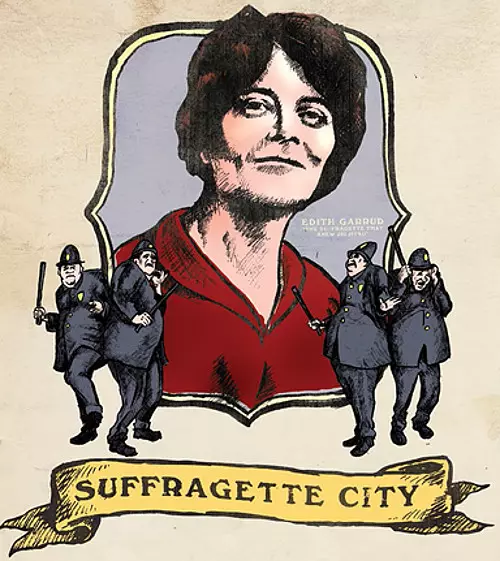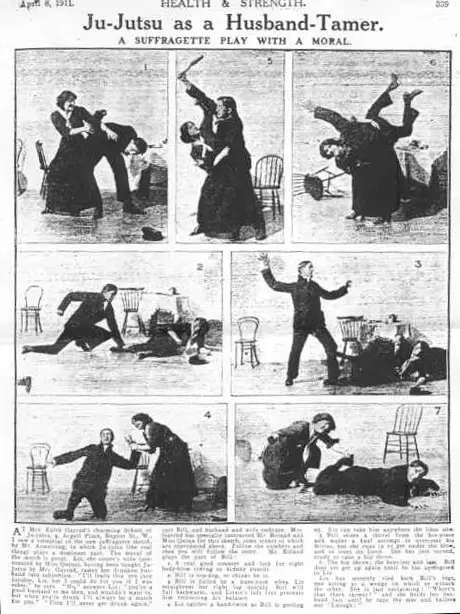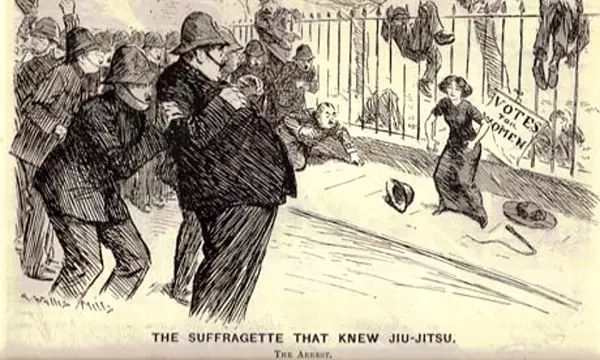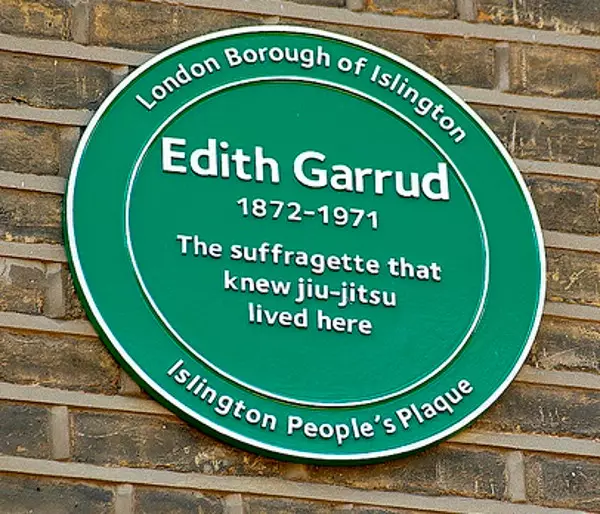
We have already told that the struggle for women's rights in England began the beginning of the 20th century was extremely fiercely. The police hunted against the souffringers, and torture was expected in prisons. A woman who was able to organize professional repulsion to the authorities was Edith Margaret Gorud.
Edith was born in 1872 and lived with his parents in Wales. After graduating from school, she began to teach gymnastics girls. Once she met William Garruda, a gymnastics coach, wrestling and boxing. She took her lessons from him, and then married him. In 1893, the spouses moved to London, where William led to fight against the university.In 1899, Harronds visited the demonstrations of Jiu-Jitsu's art, which brought Edward Barton Right to England from Japan. By the way, he was also the creator of Bartitsi's struggle, which we know about the stories about Sherlock Holmes. Edith very much liked Jiu-jitsu, especially because it allowed even a man of little growth to overcome larger and strong opponents. And she was a low woman - about one and a half meters in growth.
As they wrote at the beginning of the century in Daily Mirror about Jiu-Jitsu, this martial art is particularly suitable for women for several reasons: first, because there is no muscular power here. Secondly, in addition to self-defense skills, this art develops courage and forms a beautiful figure, in contrast to other types of struggle in which a squat figure is formed. Thirdly, the girl, compared to a man, mastering this art much faster. After all, a man is more difficult to force not to drink, do not smoke and observe the regime.
In 1908, William was headed by Giu-Jitsu's own school, in which Edith led classes for women and children. Soon, Edith had unusual student. Herrud Harding, head of the combat detachment, appealed to Herrtrude. It was a team of 25-30 strong young ladies, all the devotees of the female socio-political union. Their task was to prevent arrest of activists of the Union.
The detachment was called the "bodyguard", and the press called them "Amazons" and "Giuofrazheists". Because of the persecution of the police and the curiosity of newsmen, classes were held in secret and places had to be constantly changed. Edith taught women not only to throw opponents through the thigh, hold the grippers and strike shock. She also trained them to use the fighting equipment in the struggle (studs, umbrellas) and wear vests from dense cardboard, protecting from strikes of police clubs. She picked up a weapon for his student, which was easy to hide in the folds of the long skirts of that time - strong gymnastic makeups. Finally, she developed the tactics of the squad! And its resourcefulness could envy other leaders of partisan detachments.
Camery Square

"I arrived in London despite the army of the police. Today I am here, and no man will defend me, because it is a war of women, and we will protect ourselves! A few minutes later I will go down to you and try to arrest me! "
Soon, a fragile woman in a hat with a veil really went outside, accompanied by a troop of bodyguards. Police rushed to them in reverave. Catherine's bodyguard Katherine Villaubi Marshall exclaimed: "This is Mrs. Pankherst, girlfriend! Do not arrest it! " The police snatched their clubs, the bodyguard got Bulava. The fight turned short and bloody, and Bobby managed to grab his victim. A woman was hit on his head, threw a few police officers to the ground, where several police officers fell on her, and she lost consciousness from suffocation. Six police raised her body and began to pushed through the crowd, when Marshall screamed again: "Save Mrs. Pankherst!"
The bodyguards pursued the police on the heels, and those, having chopped off from the hail of shocks, did not immediately notice that the poor woman they grabbed was not Emmeline at all, but the supported supporter in a similar costume. Real Emmeline, waiting for general attention to the scuffle, left in the car of another faithful member of the Union.
Battle in Glasgow

On March 9, the hall was full, mainly supporters came to the meeting. The situation looked peacefully: semicircular rows of chairs, garlands of flowers, decorating the scene, posters on the walls: "I do not in a word, and the case" and "for the right to vote for women." The police surrounded the hall with a dense cordon and placed about 50 constants for insurance in the basement of the building. At the appointed time, Mrs. Pankherst did not appear. Many have decided that she could not break through the cordon, but suddenly she quickly went on stage and began his speech. Focus was simple. The suffling dismissed the rumor that they would make their way through the cordon, and in fact they went into the hall in advance as ordinary viewers, bought tickets and occupied places near the scene.
That's all that managed to say pancrust, before the police realized what was happening:
"I kept my promise and contrary to the government of His Majesty I am here. Very few people among those present, few people in our country know how much money goes to shut down the mouths of women. But the dexterity and resourcefulness of women is stronger than power and government money!
You give equal justice for men and women, equal political rights, equal legal rights, equal labor rights and equal social rights! "
There was a trample of heavy police shoes and the detachment of constable rushed up the stairs. As soon as the first and the most hefty constable appeared in the doorway, Jeni Allen, the talker-Scottish in an elegant evening dress rose from the chair, snatched a gun and fired him right in the chest. Constable fell into the confidence walking after him, that his death came, but the shot was idle.
When the police finally went around their panicing comrade, the bodyguard took Bulava and surrounded by Pankherst, which continued to read speech. 25 women gave up 50 police officers with their clubs. The viewers began to sweat the police. Several detectives in civilian clothes tried to bypass bodyguards from the flanks, climbing on the stage, but it turned out that the barbed wire was hidden inside the flower garlands. From their seats, the elderly ladies rose and began to bite the legipulated umbrellas. Women grumbled tables and armchairs. But still the police managed to break through the Pankherst and drag her in Keb, having tried her dress on it. The present were outraged - after all, the meeting was legally. As a result, the lecture turned into a protest march. Women went march to the police station, where about 4 thousand people gathered. Police had to accelerate the protesters of horses.
Happy end

The Garod family continued to train those who wish Jiu-Jitsu until 1925, and then the spouses went on peace, sold the school and took up investments in real estate. They had three children and six grandchildren. A healthy lifestyle went to Edith for the benefit, she lived 99 years old and died in 1971.
At her house today hangs sign: "Edith Gerud. Here he lived a soufgery, who knew Jiu-jitsu. "
Text author: Elizabeth Ponomarev
